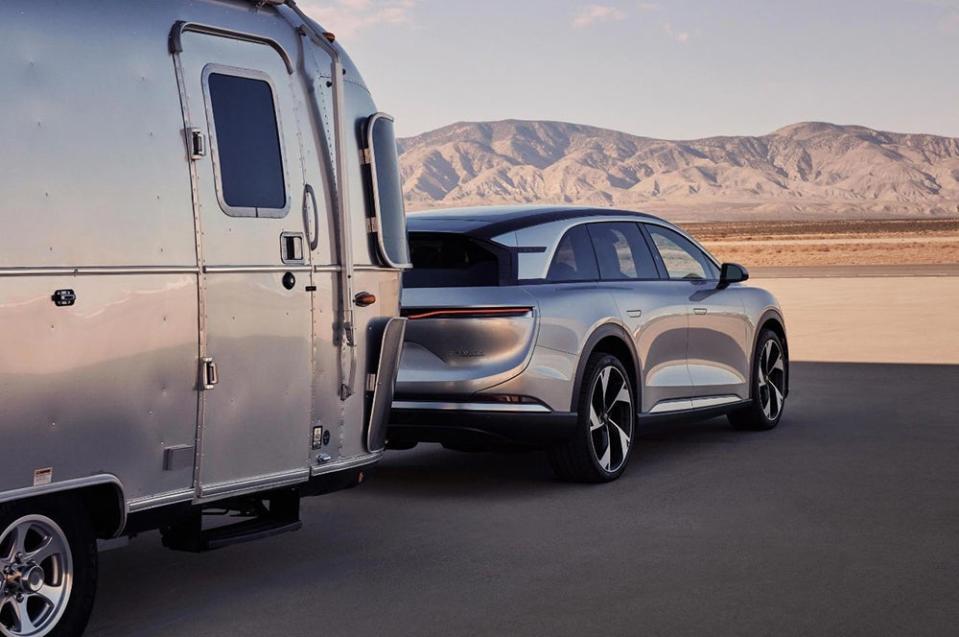Lucid says its new all-electric SUV beats Tesla Model X range by nearly 100 miles

The SUV market is big business, especially in the United States. Even supercar manufacturers like Lamborghini are making five-seat SUVs and thriving. Aston Martin’s DBX crossover represents roughly half of its overall sales. And that’s only on the gas-powered side. All-electric SUVs are just starting to find their groove, and vehicles like the three-row Kia EV9 SUV and Volkswagen ID.Buzz “microbus” are on their way to the U.S. market in 2024. Now, emerging luxury EV builder Lucid just announced the Gravity, a seven-seat SUV with an astonishing claim of 440 miles of all-electric range.
The SUV boasts other niceties like acceleration from zero to 60 miles per hour in less than 3.5 seconds, 1,500 pounds of payload (what it can carry inside) and the ability to tow 6,000 pounds. To compare, Tesla’s Model X can tow 5,000 pounds, haul 1,065 pounds inside the vehicle, and can go for 348 miles with the long-range package.
Here’s how Lucid is pushing other EV automakers to increase range and capability.
Gunning for Tesla
Lucid started producing its first model, the Air, in 2021 after more than a dozen years developing battery technology. Launched with 520 miles of EPA-estimated all-electric range and up to 1,111 horsepower, the Air earned rave reviews from users and journalists alike. Luxurious and uncommonly aerodynamic (more about that below), the Air’s starting price is roughly the same as a Tesla Model S. However, the Lucid model gets 115 more miles of range and 91 more horsepower than the Tesla.
If it sounds like an intrastate basketball rivalry, it may be partially attributed to the cross-pollination across the executive level. Before joining Lucid in 2013, CEO Peter Rawlinson spent three years at Tesla as a top engineer. Rawlinson led the engineering team for the Model S; when he left Tesla, he emerged swinging with the Lucid Air sedan.
The company’s latest accomplishment is the Gravity SUV, and Lucid says “it can achieve 440 miles of range with a battery pack a little more than half the size of some of our battery-hungry competitors.” For context, a GMC Hummer EV's battery pack alone weighs in at a hefty 2,818 pounds on the GM’s Ultium platform.
The entire Lucid Air weighs 5,203 pounds and the Gravity is expected to tip the scales north of 6,000 pounds. Sure, it’s relatively heavier than some three-row SUVs such as the Kia Telluride and Lexus GX, but it’s on par with others like the Grand Wagoneer.

Advanced battery technology
Carrying two electric motors, the Gravity is touted as more efficient than its competitors. Rawlinson says the Gravity’s smaller and lighter technology battery pack means consuming fewer precious metals and minerals and results in less energy to charge and less pressure upon the grid.
The Lucid Air is available with two battery packs–92 kilowatt hours or 112 kilowatt hours–and while Lucid is being vague about its exact specs for now, we expect the Gravity to utilize the larger 112 kWh version. For scale, the GMC Hummer EV and Cadillac Escalade IQ use packs over 200 kWh.
Justin Berkowitz, Lucid’s senior manager for technology PR, says the company offers “the most efficient electric motors on the market and ultra-high voltage power electronics (over 900 volts compared to many EVs at 400-500).” All of these are designed, patented, engineered, and manufactured in-house by Lucid, and the company also develops the software powering it all.
The stellar range is also a result of Lucid’s proprietary winding technique that produces a denser magnetic field along with several other innovations that create a super-compact package. The company holds eight patents related to the motor's windings and cooling, and continues to find ways to squeeze as much copper into the motor stator as possible to generate big energy in a small package.
Aerodynamics are also a key, and Lucid says the Gravity has a drag coefficient of under 0.24. The lower the number, the more efficient the result. Hyundai’s three-row gas-powered Palisade has a 0.33 coefficient of drag, and the upcoming Kia EV9 hits 0.28. Tesla says its Model X sits at 0.24, so Lucid is sliding just below that with the Gravity. It’s still not as aerodynamic as the five-passenger Hyundai Ioniq 6, which has an impressive 0.21 drag coefficient. Give them time, though. Lucid is poised for major growth.
